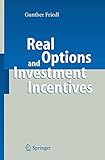Real Options and Investment Incentives [electronic resource] / by Gunther Friedl.
Publisher: Berlin, Heidelberg : Springer Berlin Heidelberg, 2007Description: XIII, 119 p. 4 illus. online resourceContent type:- text
- computer
- online resource
- 9783540482680
- 332 23
- HG1-HG9999
 eBooks
eBooks
Institutional and Methodological Background for the Analysis of Investment Incentives -- Capital Rationing as an Incentive Instrument for Growth Options -- Residual Income as a Performance Measure for Switching Options -- Residual Income as a Performance Measure in the Presence of Waiting Options -- Implications and Conclusions.
Many large corporations delegate investment decision-making authority to their divisions. Because they are better informed, divisional managers should be able to make better decisions than corporate headquarters. However, they can use this informational advantage to pursue their own interests. The objective of this work is to analyze the problem of delegated decision-making within firms when investment projects are characterized by the possibility to make subsequent decisions after the initial investment decision has been made. By analyzing this question, the monograph combines and unifies two important lines of literature: on the one hand the literature on controlling investment decisions, on the other hand the investment valuation literature.


